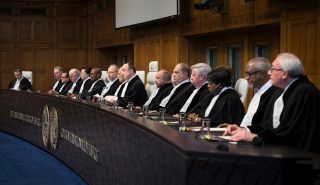On Monday, June 22, 2020, the United Nations (UN) Human Rights Council adopted, by consensus, a resolution strongly condemning all acts of violence in Libya. The council urged its rights chief, Michelle Bachelet, to dispatch a fact-finding mission to the North African country.
On June 18, 2020, the UN Human Rights Council and the International Court of Justice (ICJ) welcomed a pending resolution that would create an international Fact-Finding Mission to Libya.
In a press release, the ICJ expressed serious concerns over the escalation of conflict in Libya and the increasing number of violations and abuses of international law. These include the unlawful killings and attacks on civilians perpetrated since March 2020, when it suspended its last session.
The UN resolution expressed concern at reports of “torture, sexual and gender-based violence and harsh conditions in prisons and detention centres.”
According to the ICJ, “at least eight mass graves were discovered, mainly in Tarhuna, in which the bodies of women and children were found,” in the month of June alone. Therefore, prosecutors from the International Criminal Court (ICC) said that these mass graves may constitute war crimes.
A report indicates that these recent discoveries would fit a pattern of war crimes committed by Haftar and his forces dating back to the 1980s when he was linked to atrocities committed during the Chadian war while serving under Muammar el Qaddafi.
The ICJ has resolved to adhere to the conclusions of the Berlin Conference on Libya, held on January 19, 2020. It was stressed that accountability for gross human rights violations must be a key component of the political process in Libya.
Tarhuna, the region where the 8 mass graves were discovered, was the last stronghold of warlord Gen. Khalifa Haftar in western Libya. Hafter is the leader of the Libyan National Army, which represents the Libyan House of Representatives.
He began a military campaign on April 4, 2020, called Operation Flood of Dignity against the UN’s recognised Government of National Accord (GNA), shortly after the first session of the 2019 Libyan local elections was held successfully. The aim was to capture the western region of Libya and eventually the capital Tripoli held by the GNA ked by Fayez al-Sarraj.
The military campaign has caused the death of over 2000 people in Libya since it commenced, with world powers taking sides with either of the divides.
Haftar’s faction, the LNA, is firmly supported by Russia, Egypt and the United Arab Emirates, while the GNA is backed by the United Nations and Turkey.
Despite support from some world powers, Haftar’s self-proclaimed LNA rebel forces have continued to lose ground to the GNA, whose forces have received air and ground support from Turkey.








